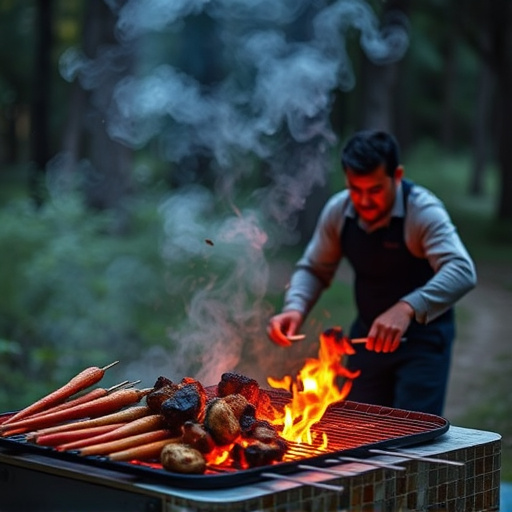Creating perfect BBQ jerky at home involves selecting lean cuts of meat, preparing a flavorful marinade with acidity, choosing between smoking or dehydrating for ideal texture, seasoning generously yet subtly, slicing meat uniformly, storing properly, and mastering cooking times for tender, delicious results using a BBQ jerky recipe.
“Transform your barbecue experience with a homemade BBQ jerky recipe that’s tender, flavorful, and perfect for snacking. This comprehensive guide takes you through every step, from selecting the best meats for jerky to mastering drying techniques and seasoning combinations. Learn cutting techniques to ensure even pieces and discover tips for long-lasting storage. Elevate your culinary skills with our expert advice on creating mouthwatering BBQ jerky that rivals any store-bought brand.”
- Choosing the Right Meats for BBQ Jerky
- Marinade Preparation: The Heart of Tender Jerky
- Drying Methods: A Key to Success
- Seasoning and Spices: Adding Flavor and Zest
- Cutting and Slicing Techniques for Uniform Pieces
- Storage and Shelf Life of Homemade BBQ Jerky
- Tips and Tricks for Perfect Results Every Time
Choosing the Right Meats for BBQ Jerky
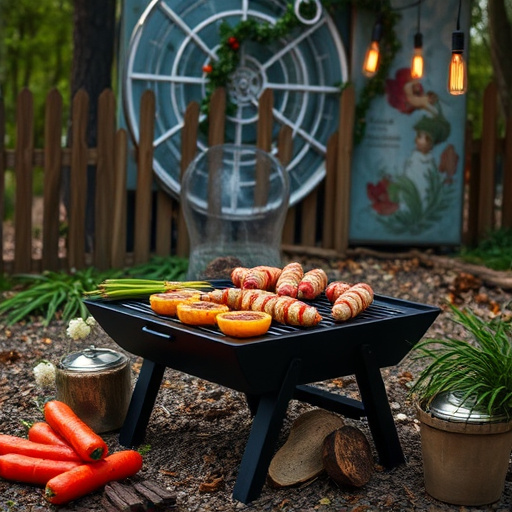
When it comes to crafting the perfect BBQ jerky at home, selecting the right meat is a crucial first step. Opt for lean cuts like sirloin or flank steak, as these will ensure your jerky turns out tender and not too fatty. These cuts of meat have less marbling, which means there’s less fat to render during the drying process, resulting in a leaner, more satisfying final product.
In terms of BBQ jerky recipes, the quality of your ingredients significantly impacts the taste. Look for high-quality, grass-fed beef if possible, as it tends to have better marbling and flavor. If you’re not a beef enthusiast, chicken or turkey breast can also work well, providing a lighter alternative with a distinct smoky flavor when properly prepared.
Marinade Preparation: The Heart of Tender Jerky
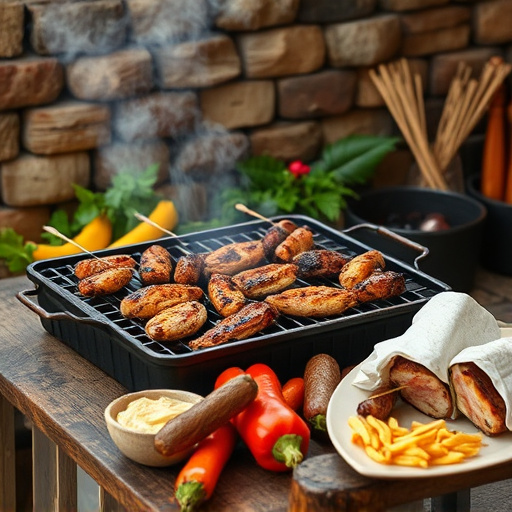
The preparation of your marinade is a key step in crafting tender, mouthwatering BBQ jerky at home. It’s the foundation that penetrates and transforms your meat, infusing it with flavor. Start by combining your favorite BBQ sauce base—this could be a classic tomato-based sauce or a smoky, savory dry rub—with a variety of aromatics like garlic, onion, ginger, and various spices such as paprika, peppercorns, and chili powder.
For the best results in your BBQ jerky recipe, ensure your marinade is well-balanced with acidity (from ingredients like vinegar or lemon juice) to help tenderize the meat and enhance flavor absorption. Let the mixture marinate for several hours or even overnight in the refrigerator, allowing the flavors to meld and deeply penetrate the meat fibers. This step is vital to achieving that perfect balance of zingy tang and smoky goodness that defines a tender BBQ jerky experience.
Drying Methods: A Key to Success
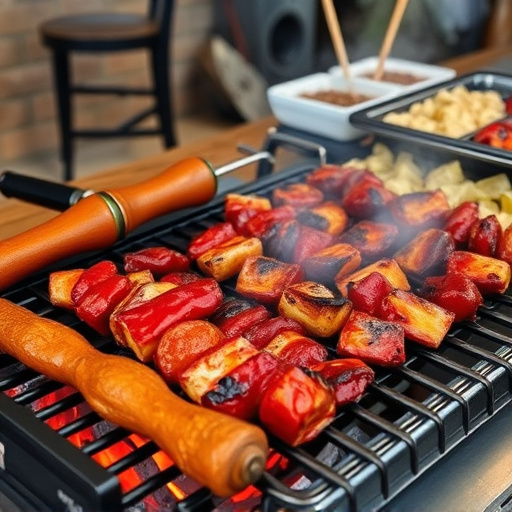
When it comes to creating the perfect BBQ jerky at home, understanding drying methods is crucial. The key to achieving tender, flavorful results lies in removing moisture from the meat efficiently. Traditional methods include using an oven or dehydrator, but for a more authentic BBQ experience, an outdoor approach with a smoker can impart delicious smoky flavors.
Each method has its advantages. Smoking offers a rich, nuanced taste, while dehydration ensures the jerky stays fresh longer. The right drying technique allows the meat’s natural enzymes to break down proteins, making it tender and ensuring each piece of jerky is satisfyingly chewy. For an optimal BBQ jerky recipe, selecting the suitable drying method based on your desired texture and flavor profile is essential.
Seasoning and Spices: Adding Flavor and Zest
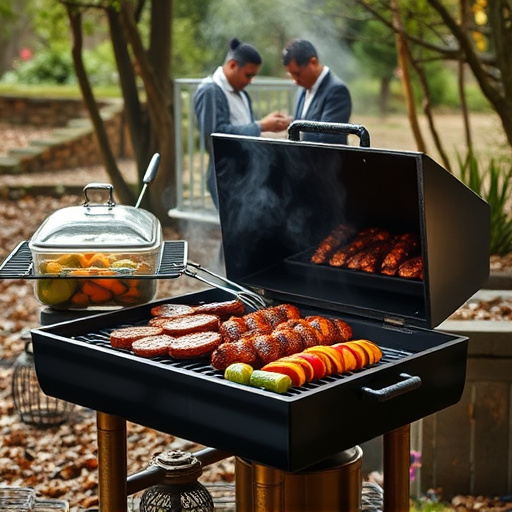
Seasoning and spices are the secret weapons in crafting irresistible BBQ jerky at home. The key is to balance flavors, ensuring a burst of taste with every bite. Start with a base blend of salt, pepper, garlic powder, and onion powder for a classic savory profile. Then, add a touch of chili powder or cayenne pepper for a subtle kick—adjust the amount based on your heat preference. Smoked paprika brings a rich, smoky aroma, while dry mustard adds a tangy zing. Don’t underestimate the power of herbs; dried thyme, oregano, or rosemary can elevate your jerky to new heights.
When seasoning your meat, be generous but mindful. You want each strip to absorb the flavors without overpowering them. Remember, these seasonings not only enhance taste but also act as preservatives, ensuring your DIY BBQ jerky is a delicious and safe snack for weeks to come. Experiment with different combinations and let your creativity guide you—after all, there’s no better BBQ jerky recipe than one tailored to your unique taste buds.
Cutting and Slicing Techniques for Uniform Pieces
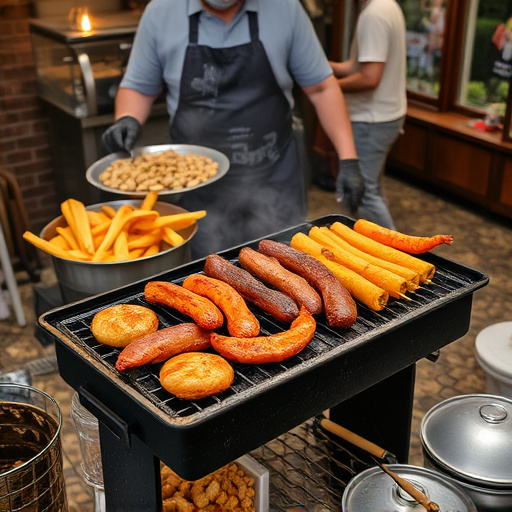
When preparing a BBQ jerky recipe, achieving uniform pieces is key to ensuring even cooking and maximum flavor. Start by selecting a quality cut of meat, ideally from the brisket or flank steak, as these cuts tend to be leaner and better suited for jerky. After your meat is chosen, carefully trim away any excess fat, leaving just a thin layer. This step is crucial not only for a healthier final product but also for even cooking.
Use a sharp knife or a meat slicer to cut the meat into thin slices. Aim for consistency in thickness, approximately 1/4 inch (0.6 cm) thick, to ensure each piece of jerky cooks evenly and reaches that perfect tender texture. Once sliced, you can further improve uniformity by arranging the slices on a cutting board and gently tapping them with a meat mallet or the flat side of a heavy pan to flatten them slightly. This simple step helps create a consistent texture throughout your BBQ jerky recipe.
Storage and Shelf Life of Homemade BBQ Jerky
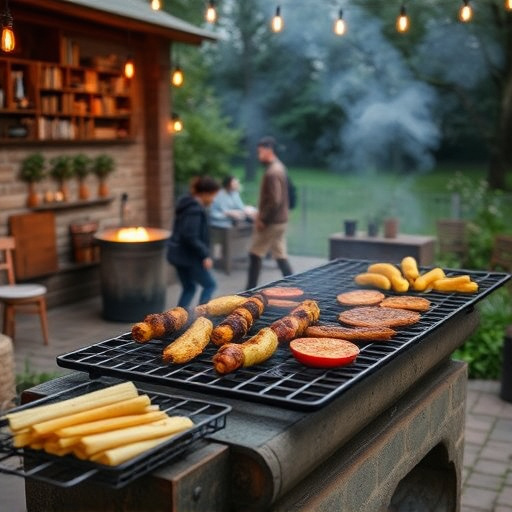
When it comes to storing your homemade BBQ jerky, it’s best to keep it in an airtight container at room temperature. This will help maintain its freshness and prevent moisture loss. You can also seal it tightly in plastic wrap or use vacuum sealing for even longer shelf life. Homemade BBQ jerky typically lasts for 1-2 weeks when stored properly. However, if you’ve used high-quality meat and followed a robust BBQ jerky recipe, it can stay delicious and safe to eat for up to a month.
For optimal taste and texture, consume your homemade jerky within the first week. After this period, it might start to lose its crunchiness and flavor intensity. Always inspect the jerky before eating; if it shows any signs of mold or off odor, discard it immediately. Proper storage is key to enjoying your DIY BBQ jerky over an extended period without compromising quality.
Tips and Tricks for Perfect Results Every Time

Achieving perfect, tender BBQ jerky at home is an art that combines precise timing, temperature control, and a keen eye for seasoning. One crucial tip is to start with high-quality, lean meat cuts like beef or venison. The thickness of the slices matters too; thinner slices cook faster but can become chewy if not monitored closely. Marinating is another game-changer; a good BBQ jerky recipe involves a mixture of vinegar, salt, and your favorite spices to break down the muscle fibers and infuse flavor.
Don’t skimp on drying time! After marinading, it’s essential to let the meat strips air dry for several hours or even overnight. This step is crucial for developing that satisfying crunchy texture. Use an oven set at a low temperature (around 170°F) or a dehydrator for consistent results. Keep an eye on them; they’ll go from jerky-like to burnt in a flash! Finally, test as you go; adjust seasoning if needed, and remember, patience is key when crafting your perfect BBQ jerky recipe.
